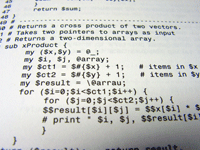|
RSS was designed to share data like headlines, links and short
descriptions of these.
RSS allows fast browsing for news and updates.
What You Should Already Know
Before you continue you should have a basic understanding of the
following:
- HTML / XHTML
- XML / XML Namespaces
If you want to study these subjects first, find the tutorials on our Home page.
What is RSS?
- RSS stands for Really Simple Syndication
- RSS allows you to syndicate your site content
- RSS is a selected list of defined items on a site
- RSS defines an easy way to share and view headlines and content
- RSS files can be automatically updated
- RSS allows personalized views for different sites
- RSS is written in XML
Why Use RSS?
RSS was designed to show selected data.
Without RSS, users will have to check your site daily to check for
newupdates. This may be too time-consuming for many users. With an RSS feed (RSS
is often called a News Feed or RSS Feed) they can check your site faster using
an RSS aggregator (a site or program that gathers and sorts out several RSS
feeds).
Since RSS data is small and fast-loading, it can easily be used with services
like cell phones or PDA's.
Web-rings with similar information can easily share data on their sites to
make them better and more useful.
Who Should Use RSS?
Webmasters who seldom update their sites do not need RSS.
RSS can be useful for Web sites that are updated frequently, like:
- News sites - Lists news with title, date and descriptions
- Site changes - Lists changed pages or new pages
- Companies - Lists news and new products
- Calendars - Lists upcoming events and important days
The Future of RSS
RSS is going to be everywhere.
Thousands of sites use RSS and more people understand its usefulness every
day.
By using RSS, information on the Web becomes easier to find and web
developers can spread their information more easily to special interest
groups.
Hopefully, future RSS versions will include additional fields that will make
it even easier to categorize and share.
|


